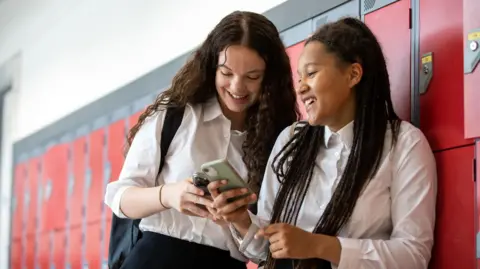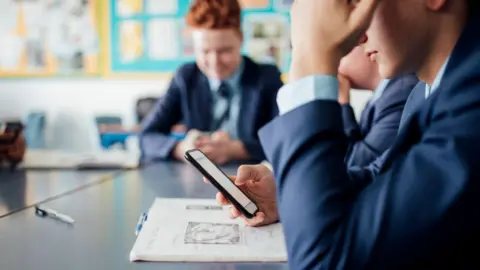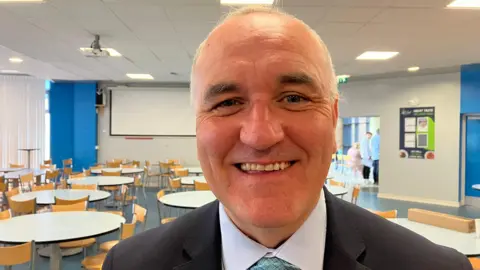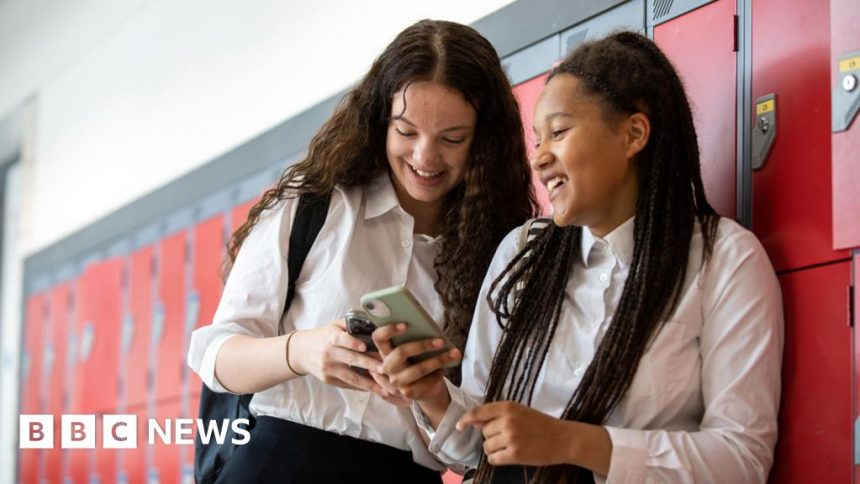Minister’s bid to restrict phone use in schools
 Getty Images/SolStock
Getty Images/SolStockSchools are expected to be advised by the education minister to restrict pupils from using mobile phones during the day.
BBC News NI understands Paul Givan is to issue new guidance to schools to crack down on mobile phone use.
It is understood to include advice that mobile phones should not be visible during the school day, including at break and lunchtimes.
It is expected to say that mobile phone bans might also help to reduce student distraction during lessons.
Not legally binding
 Getty Images/SolStock
Getty Images/SolStockA complete ban on pupils bringing phones into school is thought to be most appropriate for primary schools.
A ban is less likely to be suggested for post-primary schools.
However, post-primary pupils handing in their phones to staff at the start of the school day is thought to be one of the approaches recommended.
The guidance is likely to make exceptions for pupils who need to have a phone for medical reasons, for example.
It is also likely to say it is still important that pupils are taught digital skills.
However, it will point out that research has raised concerns about the negative impact of smartphone and social media use on children and young people’s mental health.
While the guidance is not legally binding, schools will be expected to observe it in drawing up their own rules.
Some schools already have policies in place that restrict mobile phone use by pupils.
In many cases, pupils can bring a phone to school, but they must not be visible during the school day.
That means pupils cannot take them out during classes unless they are part of a lesson, or use them at break or lunchtimes.
In some cases, if a pupil is caught using a phone, it is confiscated, and the pupil can collect it at the end of the school day.

At Londonderry’s Lisneal College there are already strict rules on pupil’s use of mobile phones.
Pupils hand their phones to their form teacher in the morning, getting it back at the end of the day.
Principal Michael Allen told the BBC’s Good Morning Ulster programme the rules encouraged learning and kept pupils safe from online harm while at school.
“If you can imagine sitting in a classroom with a mobile phone in your pocket, even if that phone is never out, and that mobile phone buzzes, rings, chimes…
“No matter how focused you are as a student, whether you decide to take that phone out and look which some pupils may do, or even if you don’t, you spend the next two or three minutes thinking ‘who was that? I wonder who wants me?’.
That scenario, he said, could play out more than 30 times per day for each pupil.
‘A very balanced approach’
Lauren Bond is a pupil at Dalriada School in Ballymoney and is president of the Secondary Students’ Union NI.
She told the programme she understands that finding a balance “can be very difficult to do.” At her school pupils do have access to their phones.
“You can check your phone occasionally but not during class times, not when the teacher is talking,” she said.
“I find that when I go home and obviously have unlimited access to my phone and those notifications are coming through constantly… because in school we have always had that very balanced approach that has allowed me to understand that when I go home I should develop the same strategy and the same approach.”
Distracting notifications
 Liam McBurney/PA Wire
Liam McBurney/PA WireBBC News NI understands that Mr Givan wants to encourage a similar, consistent approach across all schools.
He is expected to provide detailed guidance in a circular from the Department of Education (DE) to all school principals and boards of governors.
The governments in England and the Republic of Ireland have recently advised schools to ban phones during the day.
In the Republic of Ireland, the Education Minister Norma Foley said she wanted to establish a “culture of non-acceptance of the mobile phone” in schools.
MPs in England have previously said the government should consider proposals to ban smartphones for under-16s.
Unesco, the UN’s education and science body, has also previously advised that smartphones should be banned from schools to tackle classroom disruption and improve learning.
“Even just having a mobile phone nearby with notifications coming through is enough to result in students losing their attention from the task at hand,” Unesco said.
The previous guidance to schools on mobile devices from the Department of Education (DE) in Northern Ireland is eight years old.
It mainly focused on the possible educational uses of mobile phones.







